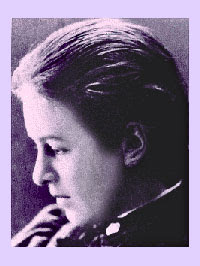 I cannot let the week pass without mentioning one of the saints of summer, whose day we remembered yesterday: Evelyn Underhill (pronounced "Eve-linn"). Evelyn Underhill (1875-1941) came to the faith later in life, first becoming a Roman Catholic and eventually an Anglican.
I cannot let the week pass without mentioning one of the saints of summer, whose day we remembered yesterday: Evelyn Underhill (pronounced "Eve-linn"). Evelyn Underhill (1875-1941) came to the faith later in life, first becoming a Roman Catholic and eventually an Anglican. Born and educated in England, Underhill is one of the giants of 20th century Christian theology and spirituality. She brought back into the conversation a recognition of mysticism as a valid expression of the religious experience. She was the first woman to give a series of lectures at Oxford on theology. At her height, she spent the mornings writing and the afternoons serving the poor and providing spiritual direction to those she mentored.
Underhill's most important book was Mysticism, published in 1911, and it is still quite readable, though long (my copy is 519 pages). She wrote at a time when modernism had dismissed religious experience as psychologically irrational, and there was more than a whiff of class prejudice in that. Underhill was able to explain the mystical experience as an exploration of the self and God's presence deep within us and outside us:
To say that God is Infinite is to say that He may be apprehended and described in an infinity of ways. That Circle whose centre is everywhere and whose circumference is nowhere, may be approached from every angle with a certainity of being being found. [Mysticism, p. 238]
Without Underhill, we might not have an appreciation of such medieval giants as Julian of Norwich (1342-1416) or Hildegard of Bingen. Underhill's influence extends to this day, and among those she exerted a crucial influence upon is L. William Countryman, the now retired professor of New Testament studies at the Church Divinity School of the Pacific; he, in turn, influenced a generation of scholars and priests with an approach to biblical studies that plumbed the underlying mysticism of the Bible. You may detect Underhill's strong influence in my preaching, for example a recent sermon I did on the Trinity and my sermons in Lent.
Underhill's approach is to see God in both the light and the darkness, in beauty and ugliness, seeing God as permeating all of existence. She concludes her great book on almost a poetic note:
According to the measure of their strength and of their passion, these, the true lovers of the Absolute, have conformed here and now to the utmost tests of divine sonship, the final demands of life. They have not shrunk from the sufferings of the cross. They have faced the darkness of the tomb. Beauty and agony alike have called them: the time of the singing of birds is come. From the deeps of the dewy garden, Life - new, unquenchable, and ever lovely - comes to meet them with the dawn. [Mysticism, pgs. 45-451]
2 comments:
Thanks for this. Underhill, and her co-conspirators in the US, such as Rufus Jones, have been important to me as well.
(I am soon moving to C'ville.)
It's great to know you're a fan of Underhill, Jim. I love her letters. Here's a quotation: "Is it not amazing when one can stand back from one's life and look back down it--or still more, peep into others' lives-- and see the action of the Spirit of God: so gentle, ceaseless, inexorable, pressing you bit by bit whether you like it or not towards your home?" (The Letters of Evelyn Underhill, 1989 reprint, pp. 126-127)
Post a Comment